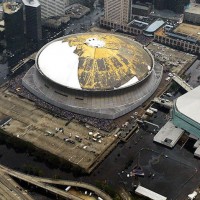Mother Nature just staged a terrorist act on our ass! — Warren Smith, “Dyes And Lyes”
About five years ago, woodwinds and flute specialist Andrew Lamb convened a recording session with his longtime musical partner Warren Smith (drums, percussion) and the bass/cello master Tom Abbs for some free form musical expression. That’s nothing new for longtime practitioners of improvised music such as these three, but this session had a special purpose: it was to put into music the strong emotions felt by those most victimized by the most devastating catastrophe to hit a certain historic and important American city.
Recorded a scant three weeks after Katrina wrecked New Orleans, New Orleans Suite is music that literally does live in the moment, in the immediate, confused and heartbreaking aftermath of the storm. Dr. John is the only other artist that I know of who put together a Katrina-inspired session so soon, but Lamb, Abbs and Smith didn’t dwell at all on nostalgia; this is all about the despair and fury that pervaded the immediate weeks following America’s largest natural disaster. Likewise, the improvised music used as a conduit for these emotions have little on common with NOLA icons like Armstrong, Longhair, Toussaint, Rebennack or scores of other Crescent City influences, but if jazz is “the sound of surprise,” then its cousin free jazz could be considered “the sound of raw emotion.” Using this method of expression, the frayed nerves and sorrow that prevailed in September, 2005 were clearly presented by Lamb and company.
New Orleans Suite was originally released in 2006, but Engine Studios has remixed and remastered the recordings and is bringing it back on August 24, just five days before the fifth anniversary of the tragedy. With this big somber commemoration coming up, it’s a good time to look back at the Lamb Trio’s ruminations.
“Dyes And Lyes” is both the central song for this album and the exception to the rest. Performed around Warren Smith’s poetry on the Bush Administration’s half-hearted response to the crisis, the group reacts to Smith’s lines like a stage play. Going into Week Four of the aftermath, “And the people are still waiting/The FEMA trucks are loaded and standing,” Smith’s expression of the frustration at the government’s inaction was a sentiment that remains plenty justified in retrospect. The song turns into a simple blues at the end as Smith mocks the sincerity of the concern for the poor when he croons that “it’s a new world order coming with the break of day.”
“Katrina’s Path” articulates the fury of the storm itself; Smith and Abbs bring the thunder and Lamb provides the unpredictable winds via his tenor sax. But as the weather changes, so goes the song as it settles into a temporary calm before coming back stronger than ever. All three are putting in remarkable performances, but Lamb is leading the way with an intense temperament. “Rescue Me” (not the Fontella Bass song), is a remarkable display of Abbs’ deftness in weaving a sinister bed of low notes that both Smith and Lamb feast on. Smith gave bells to both Lamb and Abbs to play on “Black Water” (not the Doobie Brothers song), as Smith himself played the elephant bells, giving the song an exotic, chant-like mood, only without the chants.
Smith uses on odd assortment of percussion devices on “Song Of The Miracle Lives” that seems to elicit some emotional responses out of Lamb’s weeping saxophone. The ending track “Aftermath Healing” is where the band finally plays music that sounds something like New Orleans (not that it mattered). Lamb plays harmonica over Smith’s fractured second line beat, and Abbs is playing funky, Big Easy R&B lines that holds the sparsely rendered song together. The fragile way its played sends the message that the spirit of New Orleans’ culture and character may be battered, but still lives on.
The defiant nature of the song sums up the defiant nature of the record, too, made at time when there was little hope. But five years later, the music sounds stronger than ever…and thankfully, so is the city that lies at the center of this music.



